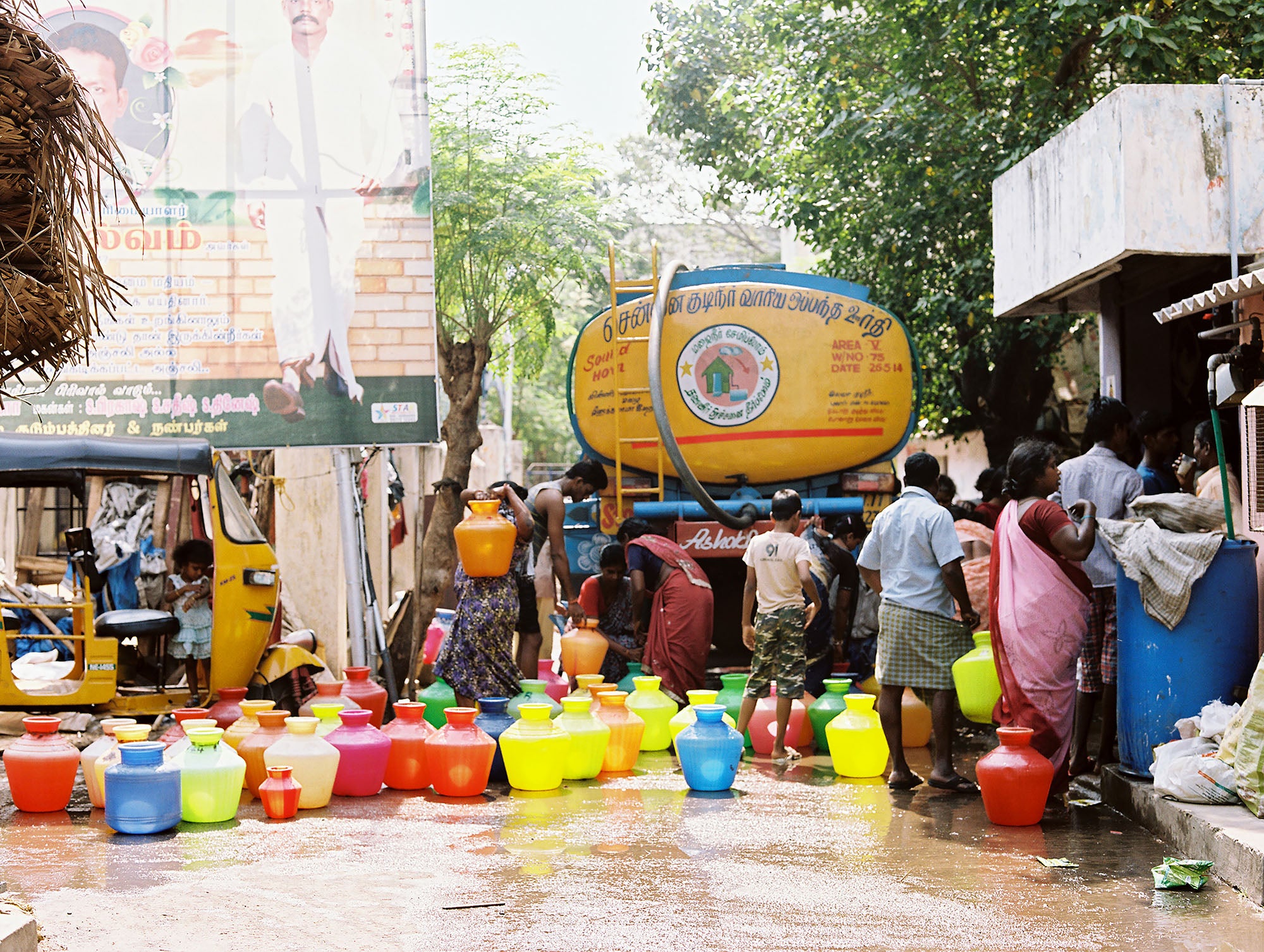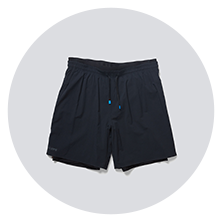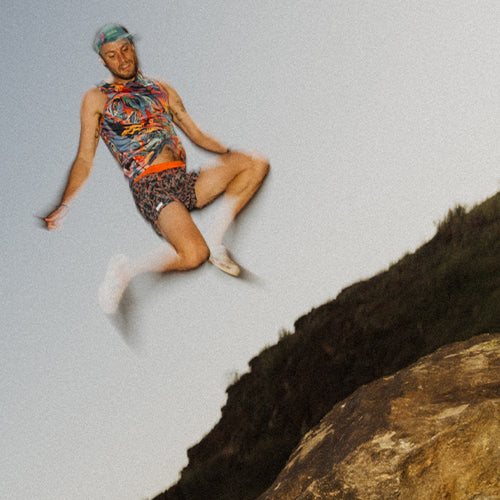DATE
May 20, 2021
CREDITS
Amar Ramesh, photographer
Elise Hanna, photographer
WORDS
Janji
RUNNERS
Rajan Bala Venkatesan
Prithivee Rajesh
Getting up before sunrise, bringing a jug to your neighborhood pump, and waiting in line for your supply of water for the week isn’t everyone’s reality.
But it is for many people worldwide. Not long before we started collaborating on our Spring 21 collection, inspired by Chennai, India, the city made international headlines when officials declared that Day Zero had arrived. Day Zero is an international term that marks the day a city’s water supply is depleted - what Chennai experienced when all four of its reservoirs almost ran dry in the summer of 2019.
While it's our promise to expand access to safe drinking water by giving 2% of proceeds from every Janji purchase to support clean water projects, we also are committed to raising awareness. A recent study from Harvard projects that in 50 years from now, nearly half of the 204 fresh water basins in the United States may not be able to meet their monthly water demand. It’s projected that many U.S. regions may see their water supplies reduced by a third of their current size, while demand continues to increase.
These projections make Chennai’s Day Zero feel closer to home, and serve as a good reminder that water is a finite resource that needs to be protected. To get a first person perspective on Day Zero, our team took some time to connect with three Chennai locals who collaborated with us on this current season to hear about their Day Zero experiences.
Chennai Locals
|
ARUN Founder of the NGO,
|
KASHMIRA Textile Designer |
RAJAN Marathoner and Model |
1. Do you remember where you were or what you were doing when Day Zero was officially called/announced?
ARUN: There was no official government declaration of Day Zero, it was more a media phenomenon. We were out of water but there were always alternative arrangements from the government to ensure that water supply was regulated through some means possible. It is when the media started talking about it that the public got anxious.
KASHMIRA: I don’t remember what I was doing then! But by the time we saw it in the news, we were already facing water problem. My apartment complex and hundreds of other in the city, which depend on bore wells for water, were left with none.
RAJAN: I remember reading about it in the news paper. It was quite shocking.
“It is our duty to ensure that we don’t abuse the natural resources. Like I read in a story once, just because we pay for water does not not mean we can waste it. It is a national resource.- RajanMarathoner and Model
|

Water collection pots in Chennai, India.
|
2. How did it impact or affect you?
ARUN: The amount of water available for our daily use drastically fell, we were a lot more aware of the need for water conservation. Many water dependent activities such as gardening, long showers etc took the toll, but we still had access to drinking water. Which in itself is an irony as several other citizens in the low income pockets were struggling even for that.
KASHMIRA: My apartment complex and hundreds of other in the city, which depend on bore wells for water, were left with none. Most apartments then start buying water by the tankers from private players, who get it from places even as far as 50 kms from the city.
RAJAN: Personally I was thinking that we were going the Cape Town way where there would be such little water that our daily lives would change forever.

Rajan and Prithivee running along Porur Lake, a primary water resource for people living in Chennai, India.
Photo credit: Amar Ramesh
3. Did it change the way you get your daily water?
ARUN: Yes, the government authorized distribution drastically fell. This also led to several private mafia taking over and exploiting the situation.
KASHMIRA: The first thing that affects is the sheer inconvenience, because instead of 24 hr piped supply, the water is rationed out as 3 hrs each in the morning and evening at fixed times.
Many residential areas in Chennai are having a rainwater harvesting system in place at least for the last ten years. Obviously that’s not enough. If the monsoon is poor for straight two years, the worry for water supply starts building up.
RAJAN: Yes this was the time that we had to start buying water for drinking. For me personally it was a big eye opener.
4. Has it affected your relationship to water and how you use it?
ARUN: In a big way, everytime our overhead tank overflows or when we see a running tap, our fear of not having this water for daily usage creeps in immediately. The impact of those 3-4 months during which we were taught a harsh lesson by nature still lingers around.
KASHMIRA: The most we can do is not waste water. Just as a note, Indian cooking is not very water intensive! Many apartments have waste water recycling for use in maintenance of gardens etc.
RAJAN: I remember telling/shouting at my daughter to turn the water tap off when she would brush. Telling her we are lucky to have water. Many people don’t have the money or resources to get tap water like we do.
 
Water collection location in Chennai, India.
|
“The most we can do is not waste water. Just as a note, Indian cooking is not very water intensive! Many apartments have waste water recycling for use in maintenance of gardens etc.- KashmiraTextile Artist and SS21 Print Artist |
5. How did it change (or not change) the city and/or Tamilians in your opinion?
ARUN: Chennai as a growing metropolis has had water issues even in the past. This time it hit almost every individual in the city and thereby making it a global headline. The fact that we had to bear the brunt of one water calamity after the other since 2015 has in a way gotten us prepared or made us resilient. It has brought in an increased sense of ownership, community collaboration etc.
KASHMIRA: The unlimited growing size of the city, makes things difficult to change, even if many people have taken measures to curtail water wastage.
All this is of course for the middle class and above, how the poor cope with this is unimaginable.
RAJAN: As a city we have definitely evolved over time and understand that water is scarce and needed to be preserved and saved for the next generations.
6. What do you want to tell other people or cities that may face similar water issues?
ARUN: Don't take nature's resources for granted. As Mahatma Gandhi said, Mother Nature provides for our need and not greed, we ought to responsibly share these resources with every lifeform.
KASHMIRA: Not wasting water towards un essential activities is of paramount importance. And this responsibility lies with every individual.
RAJAN: To not take water for granted. It is our duty to ensure that we don’t abuse the natural resources. Like I read in a story once, just because we pay for water does not not mean we can waste it. It is a national resource. In fact we should all have smart meters in our houses that monitor and track the usage and wastage of water. I am working with a company that is enabling this for buildings and apartments.

Rajan takes a running break to look out over Porur Lake in Chennai, India.
Photo credit: Amar Ramesh
“
Don't take nature's resources for granted. As Mahatma Gandhi said, Mother Nature provides for our need and not greed, we ought to responsibly share these resources with every lifeform.
- Arun
Founder of the NGO,
Environmentalist Foundation of India (EFI)
DISCOVER MORE
  |
 |




















